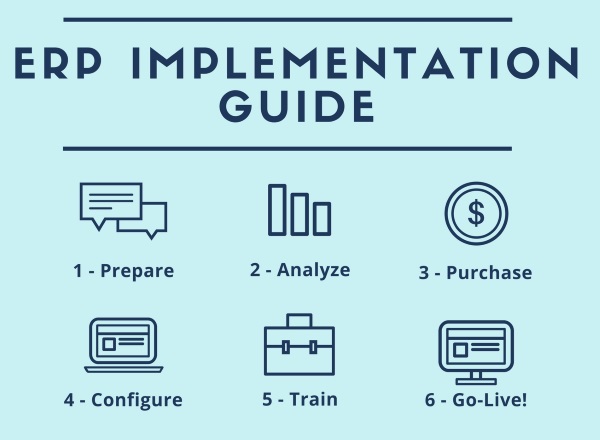Are you preparing for an ERP implementation?
Do you know that almost 40% of them fail? And that very few are actually a real success…
You would think that with that much money invested in a project, the numbers would be much better.
Nope, it’s not.
Don’t want to be part of those stats? Keep reading!
Already know what you’re getting into?
Jump to the ERP Implementation Guide.
Why implement an ERP?
If you think it’s going to be easy, you are mistaken.
I won’t sugar coat it: an ERP implementation is hard work that requires specialized knowledge and the involvement of everyone in the company, from top to bottom.
And that, for months or even years. And if you’re a small business it’s even tougher because you don’t have the knowledge and the money big enterprises have.
Then, why would you want to go through an ERP implementation? Why go through the hard work of analyzing your company in details, questioning the whole business process, making sure everyone’s is on the same page, etc.?
Because an ERP system will bring so much value, satisfaction and leverage for years to come that you cannot afford not to do it!
Advantages of an ERP
 There are many advantages to an ERP system:
There are many advantages to an ERP system:
It will make your employees job easier. I will remove useless boring tasks that don’t bring value. It will increase the knowledge you have on what’s going on at this exact moment. It will remove the need to make the same data entry in different systems. And it will do things like automatically sending the PO by email to the supplier or reminding that the stock level is low and that consumption has significantly increased in the last month.
With an ERP system, managers will be able to make better-informed decisions with access to the whole company’s data, in real time. No more guessing. And that data is accessible when they need it, how they need it.
But before you get there, it’s an energy draining process that will require everyone’s involvement for an extended period of time.
What to expect?
Know what you’re going into beforehand, it’s going to save you a lot of frustration down the road.
Needed effort
An ERP implementation is hard work. The involvement of everyone is essential – upper-management, middle-management & employees – over an extended period. Months and sometimes years. An ERP project has to be a business priority to be successful.
You’ll sometimes need to rethink your processes and do things differently. Be prepared to be flexible. An ERP project is as much a business re-engineering project as it is an IT project.
Some of the key employees of the company will be very busy during that period. Plan accordingly.
You will also require the help of external resources, especially during the analysis phase. Listen to them.
Cost of an ERP implementation
A good rule of thumb for the cost of an ERP is 5% of the company’s revenues. If you have an annual revenue of 10M$, the ERP cost should be around 500 000$. It may be more, it may be less, but that gives you a good idea.
There are a lot of expenses in an ERP implementation. There’s of course the cost of the system and its configuration, but human resources are where you ‘re going to spend the most. Do not underestimate the effort and time required from the employees in that kind of project.
There’s also the recurrent costs. You’ll have to pay an annual license to get access to the system. The recurrent costs of an ERP are usually around 15% of the purchase price. If the software initially cost 1 million dollars, you will get a bill of 150 000$ to pay every year. This gives you the right to continue using the software, the get the new updates and to have access to support.
An ERP system implementation is in no way cheap, but if you do it right, you’ll get back your money in 2 to 5 years.
Time Required
An ERP implementation may take anywhere from a couple of months to a few years. For small businesses, it may take 4 months while it may last up to 3 years for larger enterprises.
ERP implementation projects that last longer than planned are common. Companies often underestimate the effort needed, changes are required in the middle of the project, unexpected delays occur, etc. Always add + 25% to your original planning!
What will it do?
An ERP system that is a good fit for your business should support about 80% of your business. None of them are going to do everything you need in the first round.
And I always suggest not to try anyway. It’s going to be too long and too expensive. It’s best to wait for the second phase to cover those needs. Either by using workarounds, developing a small system on the side or working with the ERP vendor to customize the software.
ERP implementation vs business size
Depending on the size of your business, the ERP implementation will go this way:
Very small businesses
As the owner of a very small business, take the lead. Make sure the system works as he intends to. Implementing an ERP in a company that has less than 25 to 50 employees is pretty straight forward. As long as you put the time and makes sure that current and future needs are met, everything will go smoothly.
Often in those companies, one person is responsible for one department (one for accounting, sales, shipping, etc.). Make sure they work with the vendor to make sure the software works as they need and the implementation is likely to be a success.
I still suggest you get external help from a business analyst might be useful for a few hours just to make sure everything is in order.
Small businesses
For small businesses, an ERP implementation becomes a greater challenge.
Questions like “Are you sure your manufacturing process is efficient and that you want to use that exact process in the coming years” start to arise. Not everybody is going to agree but you still have to know the answers beforehand. Once the ERP is implemented, is much more difficult and expensive to make changes.
For that kind of business, definitively hire a business analyst that will follow you all along the project to make sure everything is on track.
A thorough business analysis is essential here. Don’t do the mistake of selecting an ERP before you know exactly how your company operates. This is a direct path to failure!
For more than 200 employees, it gets increasingly more complex and you definitively need an IT team to help you. Make sure you have a good project manager to follow the project, because it gets increasingly more complex the bigger the company.
Large enterprises
For a large enterprise, you need an ERP implementation team. There are so many considerations, stakes and stakeholders that a full-time team is required.
Project and risk management become essential since so many people will have many different needs.
The ERP implementation must be a priority for the board and the higher management. Prepare the company for a period of turmoil that will change the way thousands of people work.
Are you ready to begin an ERP implementation project?
I’ve seen companies that needed an ERP real bad to manage their business processes. The company was growing and the IT systems were not following.
You might be in that situation where you need an ERP right now, but the reality is that if your processes are a mess or you are not ready to put the effort required by that kind of project, you’ll only throw away money in the trash.
Are you ready to put the time and effort? It’s a simple question, but oh so important.
An ERP system is a powerful way for a company to leverage its strengths and to simplify the management of complex processes.
If the business is in order and the processes well oiled, the ERP project will be very positive and exciting for everyone. If the business processes are a mess, switching to an integrated system will make things worst – that is, if the ERP is ever implemented. (Most of the time these implementations will be a failure).
ERP Success Factors: 5 steps to success
Success in an ERP implementation is far from being guaranteed. As I said before, a surprising number of projects fail every year. But to limit the risks of those project, there are simple-to-understand ERP success factors that you should make sure to follow.
First, make sure everyone’s involved in the project. And when I say everyone, I really mean everyone. The higher management has to define the main objectives and long-term goals of the project and make it a priority. Middle management has to make sure support is given throughout the project and that their employees have enough time to devote to it. Employees have to be an ongoing part of the ERP project.
Know and optimize your business process. This is especially true if you are a small company that never really optimized their processes before. If you don’t do it correctly, you might be up for a surprise… Consult everyone, map the processes, know how the company works in details; this is the only way to choose a suitable ERP for your enterprise.
Handle change management and inculcate a flexibility mindset. An ERP implementation is a big project and not everything will work be as everyone wants. People will have to adapt. Some will have to change their methods. Some will have a take bigger workload.
Communication is also a major success factor. No communication means people keep their ideas, their needs and their concerns for themselves. This will cause problems down the road. All levels should be able to freely express what they think and, more importantly, their opinions should be taken into consideration.
Take. Your. Time. Rushing an implementation is a sure way to failure. Take your time to analyze the business, to listen to employees, to choose the right software. You are going to be stuck with that software for a long time and you’ll have invested quite a lot of money. Take your time. Do it well.
Reality Check
Here’s a reality check to make sure you’re ready to start that kind of project.
It’s a big project
An ERP implementation is a big project. Even if you try to keep it small, it’s going to take a lot of efforts and it’s going to take time.
Chances are it will take more time planned. In that kind of IT project, there are tons of unknown. Of course, we’ll try to minimize them, but they will still happen. Plan the unknown.
It’s mostly a business project, not an IT project
Here’s something a lot of people don’t understand before they start their ERP implementation: it’s not really an I.T. project. It’s a business project.
It’s not really about configuring a system, it’s about supporting the manufacturing process and making sure it’s efficient. It’s not really about putting data in a system, it’s about having the right information at the right time to make better business decisions.
Attack this kind of project as a business re-engineering project. Streamline and standardize your processes and use the ERP system to leverage those processes. You’ll get much more return on your investment that way!
It’ll probably take more effort than planned
Yes, your ERP implementation will probably take longer than you planned. And yes, it will probably drain more energy than you think. There will be surprises and things will not go as smooth as you’d like. An ERP implementation project is not a sprint, it’s a marathon. Sometimes it’s going to go smooth and sometimes you might spend days on a problem.
It’s tougher to make shortcuts
Before, everyone had their own system and could make shortcuts when they wanted. But not anymore. An integrated system is much less forgiving than smaller departmental systems. Now it means that the clients’ contact information the sales are putting in the system is the same that is going to be used by the whole company. A good data management becomes much more important.
That brings frustrations the first few weeks because the old ways were much faster and everyone knew how to make things work. Now there’s a new system that does not allow you to whatever you want. Don’t worry, if you did a good business analysis, it’s going to be fine in a short while.
There are also a few disadvantages to owning an ERP system. Know them beforehand!
Let’s begin the ERP Implementation!
So you think your company is actually ready to begin an ERP project?
If you have to only remember one thing… Get everyone onboard.
President, middle management, employees. Everyone must push in the same direction, towards similar goals. The ERP project must become a priority for everyone.
Alright, time to look at the step-by-step ERP Implementation Guide.

This guide will take you through the six, proven steps of an ERP implementation project.
